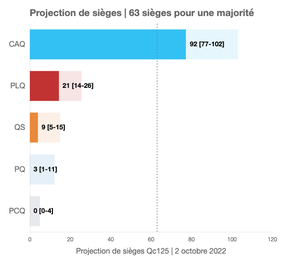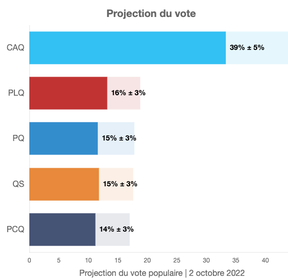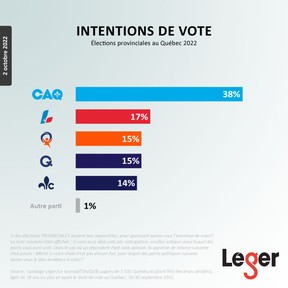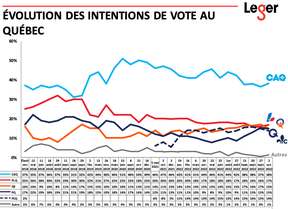Surveys point to another decisive CAQ victory but other parties are hoping for some upsets.
Sign up to receive daily headline news from the Montreal Gazette, a division of Postmedia Network Inc.
Thanks for signing up!
A welcome email is on its way. If you don't see it, please check your junk folder.
The next issue of Montreal Gazette Headline News will soon be in your inbox.
Top updates

The Liberals booked a small room
Quebec Liberal Party has rented a fairly small space for election night festivities at Corona Theatre in Dominique Anglade’s riding of Saint-Henri-Sainte-Anne. Mostly taken up by media, not a lot of space for supporters #qc2022 pic.twitter.com/p0UUGGAhTo
— Rene Bruemmer (@ReneBruemmer) October 3, 2022
Blackout in N.D.G. temporarily closes three polling stations: report
Radio-Canada is reporting that a power outage in Notre-Dame-de-Grâce has forced Elections Quebec to suspend voting in three polling stations.
The scene at PQ HQ in Boucherville
Vincent Delorme, PQ candidate in Gouin, likes the party’s chances tonight.
“We can be proud of the campaign we led and I think we’ll have some good surprises tonight.” pic.twitter.com/JXPrNn8Jzd
— Jesse Feith (@JesseFeith) October 3, 2022
CAQ could win even more seats than it did in 2018, projection suggests
There are 125 seats in the National Assembly. To win a majority, a party must win at least 63 of them.
Qc125.com, which uses polling data and previous election results to project seat totals, did one final yesterday.
The projection forecasts the percentage vote and total seats for each party:
Here’s what happened in 2018:
Here are the results of the Oct. 1, 2018 election — percentage of popular vote and seats won:
- Coalition Avenir Québec, 37.4%, 74
- Liberal Party of Quebec, 24.8%, 31
- Parti Québécois, 17%, 10
- Québec solidaire, 16.1%, 10
- Green Party of Quebec, 1.7%, 0
- Conservative Party of Quebec, 1.5%, 0


The PQ gained the most ground during the campaign, polls suggest
The last Léger poll, published yesterday, suggests François Legault’s Coalition Avenir Québec ended the campaign firmly in the lead, with about the same level of support that gave it a big majority in 2018.
The rest of the pack is bunched up in second place.
Paul St-Pierre Plamondon’s Parti Québecois made the biggest gains during the five-week campaign. The latest poll pegged its support at 15 per cent, a jump of six percentage points compared to the beginning of the campaign.
Go back further and you’ll see that Éric Duhaime’s Conservatives have come the furthest over the past 14 months.
In May 2021, the party was supported by six per cent of respondents. Today, the level is 14 per cent, Léger said.



CAQ hoping for a second act
Some very young Quebecers have voted in this election
7 p.m.
Polls close at 8 p.m.
That means the province will do better than Ontario.
In June, Ontario (the last province to hold a general election), recorded the lowest voter turnout in its history — 43.5 per cent — as incumbent Doug Ford was re-elected premier.
Turnouts in recent Quebec elections:
7 p.m.
Follow our live coverage tonight
Throughout the night, I’ll be live blogging breaking news, results and reactions.
We’ll also have coverage at montrealgazette.com by:
We’ll also have reporters covering various races:
7 p.m.
Election night: What to watch for
Here’s a look at what to watch for tonight.
Coalition Avenir Québec
Despite being on the defensive for much of the campaign, François Legault appears set to win another overwhelming majority, according to polls and projections.
Legault ran a lacklustre campaign marked by controversy and apologies over inflammatory statements about immigration and Indigenous people. In the dying days of the campaign, his handling of the COVID-19 pandemic came under scrutiny.
During the campaign, he promised to send cheques to Quebecers suffering due to inflation, even as the CAQ promised the “biggest tax reduction in the history of Quebec.”
Legault appears to have written off non-francophone voters. He rejected an invitation to an English-language debate (after taking part in one last election) and has turned down some requests for interviews in English.
The CAQ leader went so far as to erase much of the English from the CAQ’s website during the campaign. (Three of the four other parties don’t have a problem with English platforms, the only exception being the Parti Québécois).
Liberals
Dominique Anglade was uninspiring in the early days of the campaign but seemed to come to life as the CAQ repeatedly made provocative statements about immigrants.
Labelling Legault and the CAQ as intolerant, close-minded and arrogant, she presented herself as a kinder, gentler leader – a consensus seeker and unifier.
But the Quebec Liberal Party, which has given province 13 premiers since 1878, is a shadow of its former self.
Anglade faces an uphill battle as polls suggest most francophone voters have abandoned the party, and new federalist parties try to siphon off the non-francophone vote.
If she is re-elected in her own seat (it’s not a given), Anglade will have to rebuild. But it’s a tall order considering she made little headway in the two years she has been the leader.
Québec solidaire
Gabriel Nadeau-Dubois has won points with a disciplined campaign focused heavily on climate change.
Legault apparently sees him as a threat, constantly targetting Nadeau-Dubois and his left-wing party’s plan to increase taxes on SUVs and other gas-guzzling vehicles to try to reduce Quebec’s greenhouse gas emissions.
The two debates were at times a confrontation between leaders from two generations: Legault, the oldest of the leaders at 65, and Nadeau-Dubois, at 32 the youngest.
Voters seem to like what they see – polls indicate Nadeau-Dubois is a top choice as the best potential leader of the official opposition.
He tried to woo anglophones but they may be spooked by QS’s push for sovereignty. If elected, the party wants to spend $500 million to develop a constitution for an independent Quebec, which would then be put to a referendum.
Parti Québécois
Written off as dead when the election was called, the party of René Lévesque shows signs of life thanks to the campaigning of Paul St-Pierre Plamondon.
Polls suggest the party’s fortunes appear to be on the rise.
St-Pierre Plamondon’s calm demeanour and firm grasp of issues seem to have impressed voters. Viewers thought he won the debates, according to polls. The party is also out-performing rivals on the fundraising front.
An unexpected mid-campaign twist boosted the PQ leader’s chances of winning a National Assembly seat. He was in a three-way race in Camille-Laurin, an east-end Montreal riding, until his Québec solidaire opponent dropped out after getting caught removing a PQ flyer from a mailbox.
St-Pierre Plamondon now only faces one main rival – incumbent CAQ MNA Richard Campeau.
Conservatives
Thanks to anger and frustration over pandemic restrictions, Éric Duhaime has managed to revive a moribund party, with some polls placing it in second place.
Promising to slash taxes and the civil service, exploit oil and gas in the province and repeal parts of Bill 96, Duhaime has made waves during the campaign.
But Conservative support is thinly spread across the province and observers say it only has a chance of winning seats in and around Quebec City and in the Beauce.
If one of those seats is his – he’s running in Chauveau – expect fireworks in the National Assembly. A skilled communicator in both French and English, he has a way of getting under Legault’s skin, particularly on the topic of the pandemic.
Canadian Party of Quebec / Bloc Montréal
Both of the new federalist parties were born out of anger over Bill 96, the CAQ language law that further restricts the use of English in Quebec in the name of protecting the French language.
Both the Canadian Party of Quebec and Bloc Montréal also oppose Bill 21, an earlier CAQ law that bans many government employees from wearing religious symbols such as the Muslim hijab.
Both federalist parties have gone after the anglophone and allophone vote that has traditionally gone to the Liberals.
Seen by some as flash-in-the-pan protest parties, both struggled to gain media attention and political traction. But both have vowed to continue to fight for minority rights no matter what happens on Oct. 3.
The Canadian Party of Quebec presented a slate of 20 candidates, with leader Colin Standish running in Westmount–St-Louis riding.
Bloc Montréal put forward 13 candidates, including leader Balarama Holness in Notre-Dame-de-Grâce riding.
7 a.m.
Election night: Some key questions
Still popular after four years in office, François Legault of the Coalition Avenir Québec, appears unstoppable. And he may get a majority that’s even bigger than the one he won in 2018.
But that doesn’t mean it’s all over.
Some key questions that could be answered tonight:
Everything you need to know about the election
As Quebecers get set to vote in the provincial election, we’re diving into some of the hot-button issues, party promises and candidate profiles that will help you make an informed decision.
Read our full story.
Editorial: Why it’s important to vote in the Quebec election
“For English-speaking Quebecers, this has been an unusual election campaign. In past years, the Quebec Liberals were usually the only real choice for our overwhelmingly federalist community. This time, however, there are alternatives to consider and healthy competition for anglophone voters’ support. Suddenly, we’re popular!”
Read our full editorial.
Opinion: It’s Decision Day in Quebec
“The campaign is over, the speeches are done, and the only poll that matters now is the one that will be tabulated tonight, starting at 8 p.m. It’s voters’ turn to choose our government for the next four years. I’d never tell you how to vote, but I am going to tell you to go out and vote.
“It’s your right, after all. Do you really want to take it for granted?”
Read Allison Hanes’ latest column.
Scrutineers, poll workers hired at the last minute, Élections Québec says
Élections Québec was scrambling Sunday to fill dozens of vacancies in two Montreal ridings with large anglophone populations — D’Arcy-McGee and Mont-Royal—Outremont.
Read our full story, by Katherine Wilton.
ariga@postmedia.com
Read my previous live blogs here.
-

Everything you need to know about Quebec's Oct. 3 election
-

Editorial: Why it's important to vote in the Quebec election
-

Allison Hanes: It's Decision Day in Quebec


